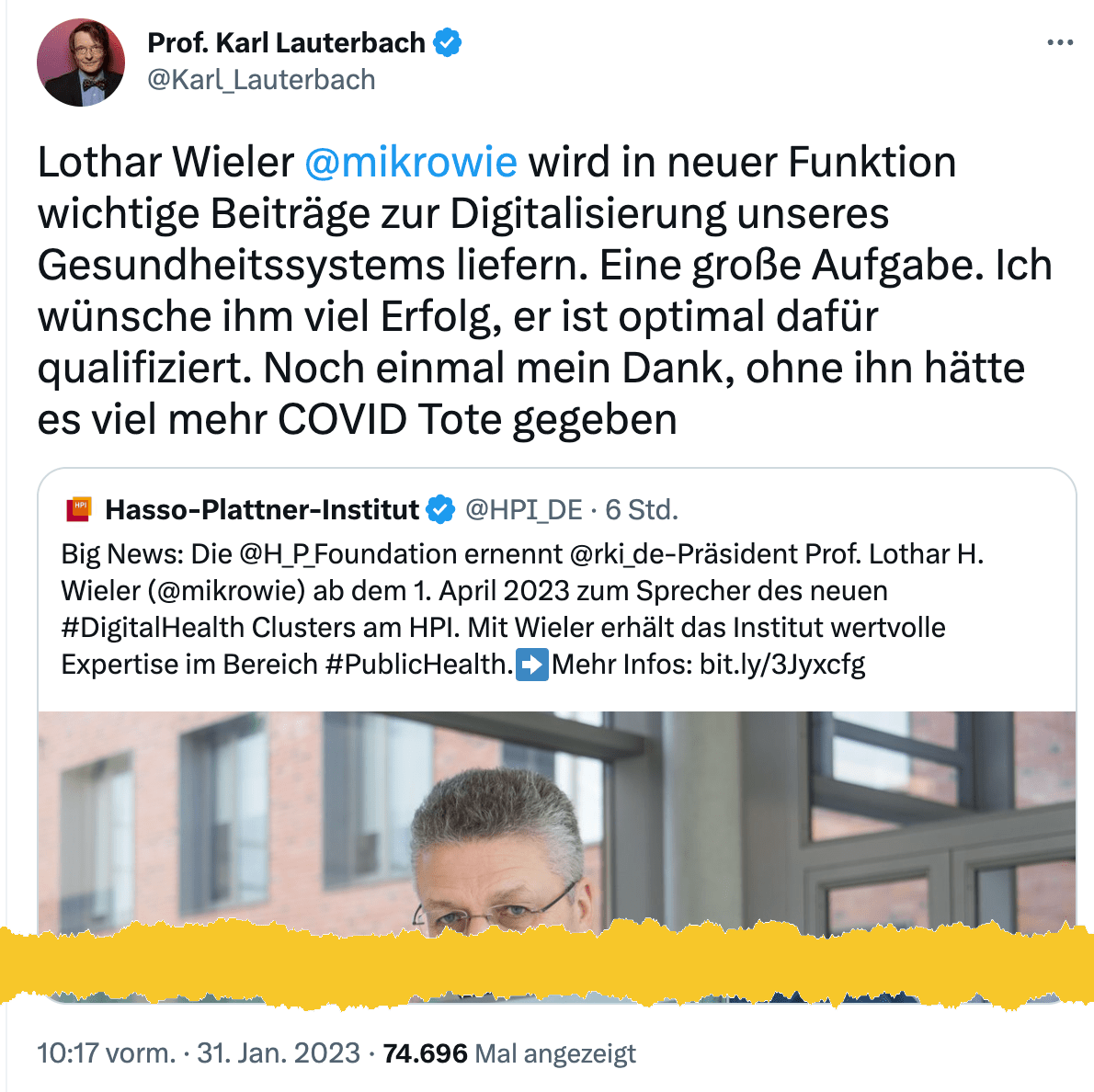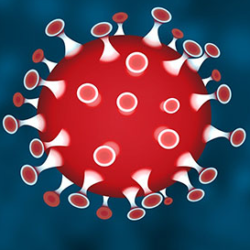Bei dem versteht es sich fast von selbst. Beide haben ja gemeinsam Millionen Tote verhindert:

Eigentlich hatte es geheißen, @mikrowie wolle in die Forschung. Aber als Sprecher hat er sich unsterbliche Meriten erworben. Da es mithin auch weiter nicht um Wissenschaft geht, paßt auch diese Gratulation:

Dieses Museum gehört mit Hasso Plattner einem der reichsten Männer der Bundesrepublik, der über seine Stiftung nun Arbeitgeber des noch amtierenden RKI-Chefs ist. Unter der Mitteilung der Hasso-Plattner-Instituts wimmelt es von solchen Glückwunschbekundungen an den ehemaligen Zuchtmeister der Nation:
Es gibt aber auch solche:
Für die Frage, was es mit diesem Hasso-Plattner-Institut auf sich hat, sei hier zunächst auf einen Beitrag aus dem März 2021 mit interessanten Verknüpfungen hingewiesen:
Im April 2022 war hier zu lesen, wie die neue Kooperation Wieler-Plattner mit vorbereitet wurde:
»Neuartiges Dashboard soll Virus-Ausbreitung durch Kontakte nachzeichnen
Ein neues Dashboard soll die Ausbreitung des Coronavirus in Deutschland anhand des Kontaktverhaltens der Menschen nachzeichnen. Mit der weiterhin hohen Sieben-Tage-Inzidenz und der Aufhebung vieler Schutzmaßnahmen steige die Dringlichkeit, effiziente Frühwarnsysteme für die Corona-Ausbreitung zu entwickeln, teilt das in Potsdam ansässige Hasso-Plattner-Institut (HPI) heute mit. Ein Forscherteam des HPI entwickelte deshalb ein Dashboard, das die Auswirkungen des Kontaktverhaltens auf die Verbreitung von Sars-CoV‑2 auf einer Deutschlandkarte abbildet. Dafür wurden anonymisierte Mobilfunkdaten mit den vom Robert-Koch-Institut (RKI) veröffentlichten Infektionszahlen zusammengeführt. Eine Besonderheit ist demnach, dass der gesamte Pandemie-Verlauf auf Bundesland-Ebene dargestellt wird.«



Das Schul-Cloud-Projekt des Hasso-Plattner-Instituts (HPI) will eine einheitliche IT-Infrastruktur für alle Schulen entwickeln. Zum 31. Juli 2021 lief das Entwicklungsprojekt planmäßig am HPI aus und wird künftig von den Bundesländern Niedersachsen, Brandenburg und Thüringen in den Regelbetrieb überführt. Den technischen Betrieb und auch die technische Weiterentwicklung der Schul-Cloud übernimmt zukünftig die Dataport – Anstalt des öffentlichen Rechts (Dataport AöR).
https://de.wikipedia.org/wiki/Hasso-Plattner-Institut#Studieng%C3%A4nge
Die HPI Schul-Cloud des Hasso-Plattner-Institutes ist eine Lernplattform zur Kommunikation zwischen Lehrern, Schülern und Eltern. Damit können sich Lehrer und Schüler Nachrichten schreiben, Dateien austauschen und den Lernfortschritt erfassen.
Das Schul-Cloud-Projekt will eine einheitliche IT-Infrastruktur für alle Schulen entwickeln. Die Infrastruktur und Anwendungen sollen nach Projektende privatisiert und lizenzpflichtig werden.
https://de.wikipedia.org/wiki/HPI_Schul-Cloud
Dataport
https://de.wikipedia.org/wiki/Dataport
Immerhin hat der Mann nicht gelogen, als er bei seinem Abgang vom RKI sagte, er könne genauso wie bisher wissenschaftlich arbeiten. Vorher null, jetzt null – immerhin scheint das HPI seine Fähigkeiten realistisch einschätzen zu können. Grüßaugust mit Verbindungen – früher nannte man das Cheflobbyist.
Gibt es den Begriff "Vetternwissenschaft" schon oder kann man sich den noch registrieren lassen? 😀
Plattner Foundation: HPI Digital Health Center
The HPI Digital Health Center (DHC) brings together individuals from health sciences, human sciences, data sciences, digital engineering, and society with the shared goal of improving health and well-being. The center comprises an open, inclusive network structure of researchers, projects, and research institutions designed to empower patients and transform healthcare with innovative digital health solutions. In March 2019, the Hasso Plattner Institute for Digital Health at Mount Sinai (HPI•MS) was formed as the result of a cooperation agreement between the Mount Sinai Health System (MSHS) in New York City and the Hasso Plattner Institute (HPI). With HPI•MS, both institutions aim to develop digital health solutions that empower patients and healthcare providers while improving health and health outcomes. With world-class expertise and complementary resources in healthcare, data sciences, and biomedical and digital engineering, the new HPI•MS brings together experts with combined excellence in healthcare delivery, health sciences, biomedical and digital engineering, machine learning, and artificial intelligence to develop digital products with real-time predictive and preventive capabilities.
plattnerfoundation.org/digital-health/
HPI Digital Health Center
The Center assumes an open, inclusive network structure of researchers, projects and research institutions in order to empower patients and to transform healthcare with innovative digital health solutions. Research at HPI DHC is organized in three divisions (Fachbereiche), including Personalized Medicine (led by Professor Erwin Böttinger), Machine Learning in Human Health (led by Professor Christoph Lippert), and Connected Health (led by Professor Bert Arnrich).
In March 2019, the Hasso Plattner Institute for Digital Health at Mount Sinai (HPI·MS) was formed ...
hpi.de/digital-health-center/home.html
HPI・MS
HPI・MS invites exceptional scholars with expertise in machine learning, artificial intelligence, and computer science to contribute to applications in human health at the Mount Sinai Health System, New York
We are a global research institute rapidly developing digital health solutions that empower patients and healthcare providers.
hpims.org/
HPI・MS publications
hpims.org/publications
Federated Learning of Electronic Health Records to Improve Mortality Prediction in Hospitalized Patients With COVID-19: Machine Learning Approach
https://medinform.jmir.org/2021/1/e24207/
Towards a fine-scale population health monitoring system
Abstract
Understanding population health disparities is an essential component of equitable precision health efforts. Epidemiology research often relies on definitions of race and ethnicity, but these population labels may not adequately capture disease burdens specific to sub-populations. Here we propose a framework for repurposing data from Electronic Health Records (EHRs) in concert with genomic data to explore enrichment of disease within sub-populations. Using data from a diverse biobank in New York City, we genetically identified 17 sub-populations, and noted the presence of genetic founder effects in 7. By then linking community membership to the EHR, we were able to identify over 600 health outcomes that were statistically enriched within a specific population, with many representing known associations, and many others being novel. This work reinforces the utility of linking genomic data to EHRs, and provides a framework towards fine-scale monitoring of population health.
https://www.biorxiv.org/content/10.1101/780668v1
Genetic analyses of diverse populations improves discovery for complex traits
https://www.nature.com/articles/s41586-019-1310-4
Racial and Ethnic Disparities in Pregnancy-Related Acute Kidney Injury
https://journals.lww.com/kidney360/Fulltext/2020/03000/Racial_and_Ethnic_Disparities_in_Pregnancy_Related.6.aspx
Trans-ethnic and Ancestry-Specific Blood-Cell Genetics in 746,667 Individuals from 5 Global Populations
https://www.cell.com/cell/fulltext/S0092-8674(20)30822-9
Containment of future waves of COVID-19: simulating the impact of different policies and testing capacities for contact tracing, testing, and isolation
https://www.medrxiv.org/content/10.1101/2020.06.05.20123372v1
፨
Künstliche Intelligenz soll Daten von Robert-Koch-Institut ordnen
10.12.2021 — Handelsblatt
Einen Rahmenvertrag mit Data4Life hat RKI-Präsident Lothar Wieler im November unterschrieben, wie Handelsblatt Inside erfuhr.
handelsblatt.com/inside/digital_health/digitale-gesundheitsforschung-kuenstliche-intelligenz-soll-rki-daten-sortieren-/27883978.html
፨
COVID Behaviors Dashboard
Formerly the KAP COVID Dashboard
The Johns Hopkins Center for Communication Programs COVID Behaviors dashboard presents data from a global survey of knowledge, attitudes and practices around COVID-19.
Insights and analyses on how to use the data were written by researchers and social and behavior change communication experts at Johns Hopkins CCP in collaboration with WHO’s Global Outbreak Alert and Response Network (GOARN).
The data visualized here are from the COVID-19 Trends and Impact Survey (CTIS), launched by Facebook in partnership with the Delphi Group at Carnegie Mellon University in the United States and the University of Maryland Social Data Science Center globally.
ccp.jhu.edu/kap-covid/
COVID Behaviors Dashboard
EXPLORE: Global and Regional View of Vaccine Acceptance and Related Behaviors
Johns Hopkins Center for Communication Programs’ COVID Behaviors Dashboard presents data from a global survey of knowledge, attitudes and practices around COVID-19. Analysis and content on the COVID Behaviors Dashboard is developed by Johns Hopkins Center for Communication Programs and the World Health Organization’s (WHO) Global Outbreak Alert and Response Network (GOARN). Scroll down to explore the data for a country or WHO region.
covidbehaviors.org/
፨
“Es gibt keine Pandemie, es gibt COVAX, ein Menschheitsverbrechen und globales Medizinverbrechen.”
,,Transparenz: Digitalauschluss im Bundestag
Der Digitalausschuss wird auch unter der Ampel-Koalition nicht standardmäßig öffentlich tagen. Weil zu wenig technische Kapazitäten im Bundestag vorhanden sind, könnte der Livestream sogar ausfallen, wenn der Ausschuss doch mal Öffentlichkeit will. Kritik am Beschluss kommt von der Linken."
Netzpolitik.org 01.02.2023
https://netzpolitik.org/2023/transparenz-digitalauschluss-im-bundestag/
Sachverständigenrat Gesundheit und Pflege neu berufen
01.02.2023 12:20
Bundesgesundheitsminister Karl Lauterbach hat zum 1. Februar 2023 einen neuen Sachverständigenrat Gesundheit & Pflege berufen. In dem unabhängigen Gremium sind sieben Professorinnen und Professoren aus den Bereichen Medizin, Ökonomie, Versorgungsforschung und Pflegewissenschaft vertreten.
https://www.monitor-versorgungsforschung.de/news/sachverstaendigenrat-gesundheit-und-pflege-neu-berufen/